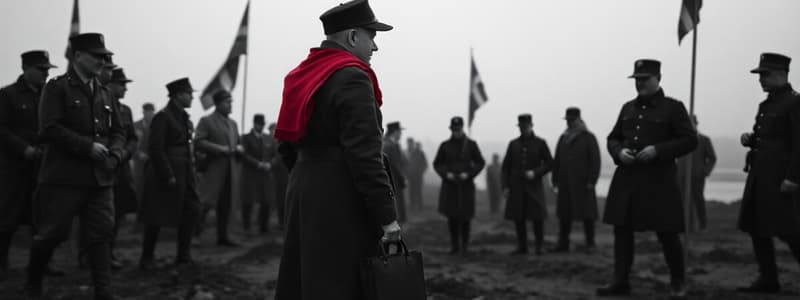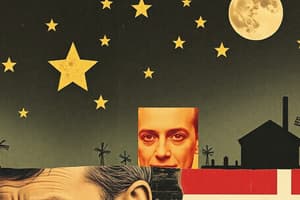Podcast
Questions and Answers
Considering the socio-political milieu depicted in the excerpt, which inference regarding the Danish Resistance can be most justifiably extrapolated from Peter Nielsen's dissemination of news concerning sabotage?
Considering the socio-political milieu depicted in the excerpt, which inference regarding the Danish Resistance can be most justifiably extrapolated from Peter Nielsen's dissemination of news concerning sabotage?
- The Danish Resistance operated with complete impunity, facing minimal repercussions for their subversive activities due to the occupying forces' negligence.
- Peter Nielsen's role as a news disseminator indicates a formal, hierarchical structure within the Danish Resistance, mirroring conventional military command chains.
- The focus on sabotage in Peter Nielsen's news implies that the Danish Resistance primarily employed violent, large-scale confrontations against the Nazi regime, disregarding covert operations.
- The dissemination of sabotage news by figures like Peter Nielsen suggests a decentralized and clandestine communication network vital for maintaining morale and coordinating resistance efforts. (correct)
Given Kirsti's preoccupation with the absence of butter and sugar for cupcakes, and her simultaneous awareness of her father's positive remark about her appearance, which cognitive dissonance is most acutely manifested in her childlike perspective amidst the backdrop of wartime scarcity?
Given Kirsti's preoccupation with the absence of butter and sugar for cupcakes, and her simultaneous awareness of her father's positive remark about her appearance, which cognitive dissonance is most acutely manifested in her childlike perspective amidst the backdrop of wartime scarcity?
- Kirsti's focus on culinary desires and paternal approval indicates a complete detachment from the gravity of the Nazi occupation, suggesting a psychological defense mechanism of denial.
- Kirsti's desire for cupcakes and her father's compliment exemplify a sophisticated understanding of propaganda techniques employed by occupying forces to normalize scarcity.
- Kirsti's longing for cupcakes and her father’s praise highlight the incongruity between the normalcy of familial affection and the abnormal deprivations imposed by wartime conditions, reflecting a child's struggle to reconcile personal desires with imposed limitations. (correct)
- The juxtaposition of Kirsti's concerns reveals a nascent comprehension of the economic ramifications of war, specifically inflation and trade embargoes, on domestic life.
When the mother assures her daughters that the Nazis will 'forget their faces and disappear,' what latent rhetorical strategy is most plausibly being employed to mitigate the psychological impact of the occupation on her children?
When the mother assures her daughters that the Nazis will 'forget their faces and disappear,' what latent rhetorical strategy is most plausibly being employed to mitigate the psychological impact of the occupation on her children?
- The statement functions as a psychological mechanism of temporal distancing, attempting to diminish the immediate anxiety by projecting a future where the present threat is no longer extant, thereby offering solace and resilience. (correct)
- This assertion constitutes a form of anticipatory grief, preparing the daughters for the potential future absence of the Nazis while acknowledging the immediate threat.
- The mother's declaration is best interpreted as a strategic deployment of denial, aimed at fostering a false sense of security and minimizing perceived danger to the children.
- The mother's statement represents a factual prediction based on classified intelligence regarding Allied military strategy and the imminent collapse of the Nazi regime.
The mother's remark that 'there will be cupcakes again when the war ends' functions as a potent symbol within the narrative. Which interpretation most accurately captures the multifaceted symbolic weight of 'cupcakes' in this context?
The mother's remark that 'there will be cupcakes again when the war ends' functions as a potent symbol within the narrative. Which interpretation most accurately captures the multifaceted symbolic weight of 'cupcakes' in this context?
Considering the excerpt’s depiction of Peter Nielsen's activities and the risks associated with resistance in occupied Denmark, what critical ethical paradox is most acutely foregrounded by his role as a news bearer and participant in sabotage?
Considering the excerpt’s depiction of Peter Nielsen's activities and the risks associated with resistance in occupied Denmark, what critical ethical paradox is most acutely foregrounded by his role as a news bearer and participant in sabotage?
Flashcards
Nazi occupation in Denmark
Nazi occupation in Denmark
The period when Nazi Germany controlled Denmark during World War II.
Resistance movement
Resistance movement
Groups of people who fought against Nazi rule to help their country.
Peter Neilsen
Peter Neilsen
A character who delivers news about sabotage against the Nazis.
Kirsti's wishes
Kirsti's wishes
Signup and view all the flashcards
Hope for peace
Hope for peace
Signup and view all the flashcards
Study Notes
Number the Stars - Summary
- Peter Neilsen hid secret papers among ordinary books
- Mama burned the papers after reading
- Annemarie heard conversations about sabotage and Nazi activities
- Nazi sabotaged factories and damaged railroad lines
- Resistance fighters were Danish and very secretive
- Resistance fighters damaged German trucks and cars
- Resistance fighters bombed German factories
- Ellen stated that German soldiers were everywhere
- Ellen warned that the girls would be remembered by German soldiers if they didn't blend in
- Mama asks if there are any food
- Mama gives Annemarie bread for herself and Kirsti.
- Kirsti asked if they could have butter on the bread
- Mama responded that there is no butter
- Kirsti wishes for a cupcake
- Mama remarked that there is no butter or sugar for cupcakes for a long time
- Mama notes that there will be cupcakes again after the war ends
Studying That Suits You
Use AI to generate personalized quizzes and flashcards to suit your learning preferences.



